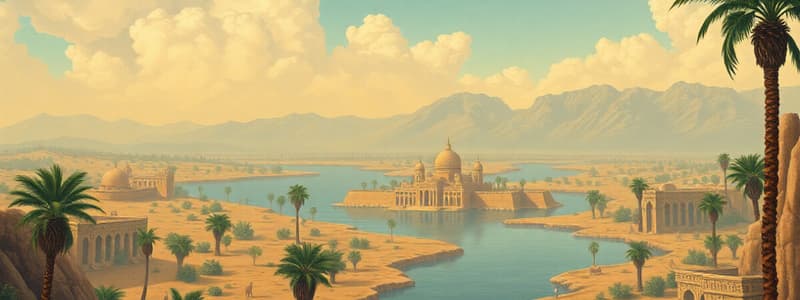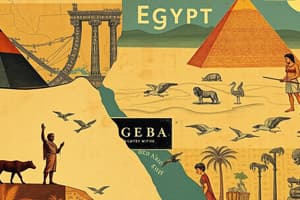Podcast
Questions and Answers
Which of these is NOT a characteristic of the New Kingdom in Egypt?
Which of these is NOT a characteristic of the New Kingdom in Egypt?
- Conquest of land in Asia and Africa
- Period of great power and expansion
- Development of advanced irrigation systems (correct)
- Pharaohs as powerful rulers
Scribes and artisans in ancient Egypt held the same social status.
Scribes and artisans in ancient Egypt held the same social status.
False (B)
What was the primary role of the Pharaoh in ancient Egyptian society?
What was the primary role of the Pharaoh in ancient Egyptian society?
The Pharaoh was the supreme ruler of Egypt, seen as both a political leader and a divine figure.
The god ____ was worshipped as the sun god and made a daily journey across the sky.
The god ____ was worshipped as the sun god and made a daily journey across the sky.
Match the following Egyptian rulers with their notable accomplishments:
Match the following Egyptian rulers with their notable accomplishments:
What was a primary reason for Egypt's conquest of Kush?
What was a primary reason for Egypt's conquest of Kush?
Mummification practices were primarily intended for religious purposes, with little practical scientific value.
Mummification practices were primarily intended for religious purposes, with little practical scientific value.
What were some of the key factors that led to the decline of Kush in the 200s CE?
What were some of the key factors that led to the decline of Kush in the 200s CE?
After being conquered by Egypt, Kush continued to thrive in the region of ____.
After being conquered by Egypt, Kush continued to thrive in the region of ____.
Which of these was NOT a luxury good traded between Egypt and Kush?
Which of these was NOT a luxury good traded between Egypt and Kush?
What was the main benefit of the annual flooding of the Nile for Egyptian farmers?
What was the main benefit of the annual flooding of the Nile for Egyptian farmers?
The Red Land was known for its fertile soil that promoted agriculture.
The Red Land was known for its fertile soil that promoted agriculture.
What agricultural technique did early Egyptian farmers develop to manage water supply?
What agricultural technique did early Egyptian farmers develop to manage water supply?
The fertile land created by the annual flooding of the Nile is known as the ______.
The fertile land created by the annual flooding of the Nile is known as the ______.
Match the following terms with their descriptions:
Match the following terms with their descriptions:
Why was the Nile Delta important for Egyptian settlement and agriculture?
Why was the Nile Delta important for Egyptian settlement and agriculture?
Food surpluses had little impact on the growth of Egyptian cities.
Food surpluses had little impact on the growth of Egyptian cities.
Name one key achievement of the Old Kingdom.
Name one key achievement of the Old Kingdom.
Flashcards
Middle Kingdom achievements
Middle Kingdom achievements
Egypt invented irrigation and built canals to prevent floods.
New Kingdom expansion
New Kingdom expansion
The New Kingdom was a period when Pharaohs conquered lands in Asia and Africa.
Egyptian social structure
Egyptian social structure
Egyptian society was hierarchical, with Pharaoh at the top followed by nobles, priests, and others.
Role of scribes
Role of scribes
Signup and view all the flashcards
Influence of religion
Influence of religion
Signup and view all the flashcards
Egyptian afterlife beliefs
Egyptian afterlife beliefs
Signup and view all the flashcards
Mummification importance
Mummification importance
Signup and view all the flashcards
Hatshepsut's contributions
Hatshepsut's contributions
Signup and view all the flashcards
Thutmose III's expansion
Thutmose III's expansion
Signup and view all the flashcards
Trade with Kush
Trade with Kush
Signup and view all the flashcards
Nile River's Role
Nile River's Role
Signup and view all the flashcards
Nile Delta
Nile Delta
Signup and view all the flashcards
Black Land vs. Red Land
Black Land vs. Red Land
Signup and view all the flashcards
Food Surplus
Food Surplus
Signup and view all the flashcards
Irrigation Techniques
Irrigation Techniques
Signup and view all the flashcards
Narmer (Menes)
Narmer (Menes)
Signup and view all the flashcards
Great Pyramid of Giza
Great Pyramid of Giza
Signup and view all the flashcards
Old Kingdom Achievements
Old Kingdom Achievements
Signup and view all the flashcards
Study Notes
Geography and the Nile River's Influence
- Egypt's geography, including the Nile River and surrounding deserts, was crucial to its civilization's development.
- The Nile's annual floods deposited fertile silt, creating the "Black Land," ideal for agriculture.
- Deserts provided resources and acted as natural barriers, facilitating trade and transportation.
- The Nile Delta was a crucial region for settlement and agriculture, benefiting from the rich soil and irrigation possibilities.
Agriculture and Settlement
- The Nile's predictable (but sometimes unpredictable) flooding was vital for Egyptian agriculture.
- The "Black Land" contrasted sharply with the "Red Land" desert, shaping different aspects of Egyptian life.
- Farmers developed irrigation techniques to manage water resources and create food surpluses.
- Food surpluses led to population growth and the rise of cities, as rulers collected taxes and supported artisans.
Early Dynastic Period and Kingdom Unification
- Narmer (Menes) unified Upper and Lower Egypt, marking a significant turning point in Egyptian history.
- The Old Kingdom saw major achievements like the construction of pyramids, including the Great Pyramid of Giza and the Sphinx.
Middle and New Kingdoms
- The Middle Kingdom faced environmental challenges but achieved advancements improving irrigation and flood control methods.
- The New Kingdom was a period of expansion, with pharaohs conquering lands in Asia and Africa, enhancing Egypt's power.
Egyptian Society and Social Structure
- Egyptian society was hierarchical, with the pharaoh at the top, followed by nobles, priests, officials, scribes, merchants and artisans, and lastly, farmers, servants, and slaves.
- Scribes played a vital role in record-keeping and administration.
- Artisans contributed to Egyptian art and construction.
Religion and Daily Life
- Egyptian religion profoundly influenced daily life, government, and social structure.
- The belief in many gods controlling various aspects of life shaped Egyptian practices.
- Temples, prayers, and offerings were essential ways to honor the gods.
Afterlife Beliefs and Practices
- Egyptians believed in an afterlife, influencing their extensive preparations for burial, including mummification.
- The process of mummification preserved bodies and facilitated studies of ancient Egyptian lives.
Notable Pharaohs and their Contributions
- Hatshepsut was a powerful female ruler known for her trade expeditions.
- Thutmose III expanded Egypt's empire through military conquests.
- Ramses II is remembered for his monuments, military campaigns, and treaties.
Trade and Resources
- Egypt relied on trade for resources it lacked, such as timber, minerals, and horses, and imported them through trade with Kush.
- Trade brought precious goods and increased Egypt's wealth.
Kush and Egypt's Relationship
- Egypt frequently conquered Kush, seeking its resources like gold.
- Kush developed its own civilization, including sophisticated practices like ironworking and the construction of pyramids.
- The interactions between Egypt and Kush had a complex interwoven history, with periods of conflict and mutual benefit.
Decline of Kush
- The decline of Kush followed a series of conquests and challenges.
- The eventual decline was influenced by internal conflicts and external pressures, such as the pressure from Roman Empire.
Studying That Suits You
Use AI to generate personalized quizzes and flashcards to suit your learning preferences.




